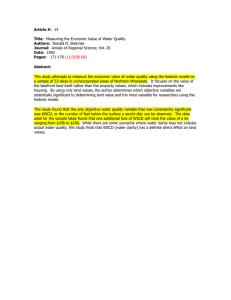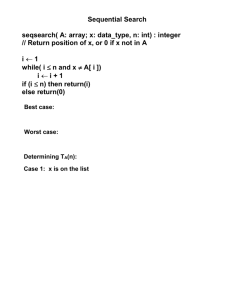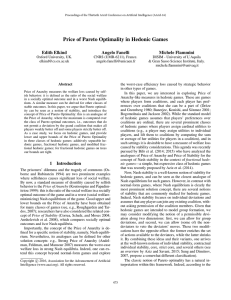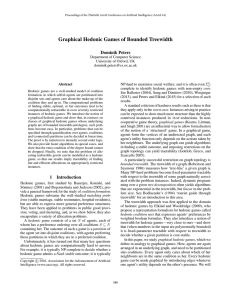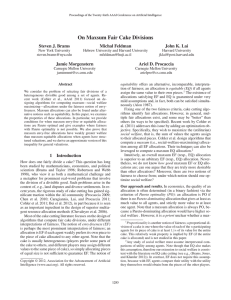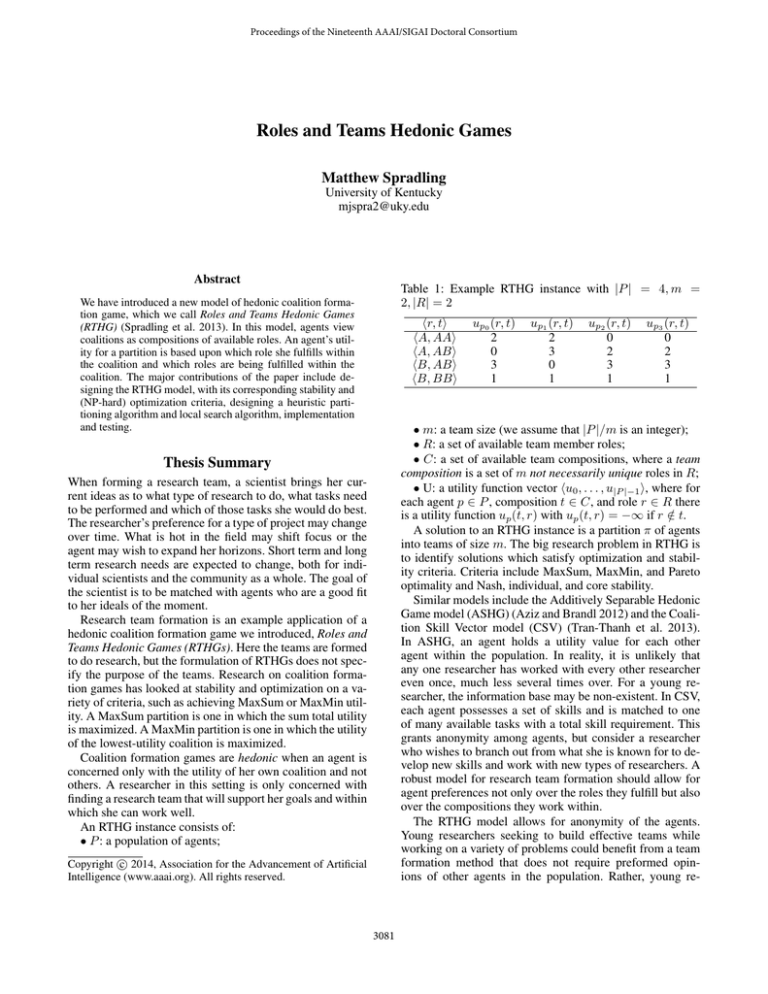
Proceedings of the Nineteenth AAAI/SIGAI Doctoral Consortium
Roles and Teams Hedonic Games
Matthew Spradling
University of Kentucky
mjspra2@uky.edu
Abstract
Table 1: Example RTHG instance with |P | = 4, m =
2, |R| = 2
We have introduced a new model of hedonic coalition formation game, which we call Roles and Teams Hedonic Games
(RTHG) (Spradling et al. 2013). In this model, agents view
coalitions as compositions of available roles. An agent’s utility for a partition is based upon which role she fulfills within
the coalition and which roles are being fulfilled within the
coalition. The major contributions of the paper include designing the RTHG model, with its corresponding stability and
(NP-hard) optimization criteria, designing a heuristic partitioning algorithm and local search algorithm, implementation
and testing.
hr, ti
hA, AAi
hA, ABi
hB, ABi
hB, BBi
up0 (r, t)
2
0
3
1
up1 (r, t)
2
3
0
1
up2 (r, t)
0
2
3
1
up3 (r, t)
0
2
3
1
• m: a team size (we assume that |P |/m is an integer);
• R: a set of available team member roles;
• C: a set of available team compositions, where a team
composition is a set of m not necessarily unique roles in R;
• U: a utility function vector hu0 , . . . , u|P |−1 i, where for
each agent p ∈ P , composition t ∈ C, and role r ∈ R there
is a utility function up (t, r) with up (t, r) = −∞ if r ∈
/ t.
A solution to an RTHG instance is a partition π of agents
into teams of size m. The big research problem in RTHG is
to identify solutions which satisfy optimization and stability criteria. Criteria include MaxSum, MaxMin, and Pareto
optimality and Nash, individual, and core stability.
Similar models include the Additively Separable Hedonic
Game model (ASHG) (Aziz and Brandl 2012) and the Coalition Skill Vector model (CSV) (Tran-Thanh et al. 2013).
In ASHG, an agent holds a utility value for each other
agent within the population. In reality, it is unlikely that
any one researcher has worked with every other researcher
even once, much less several times over. For a young researcher, the information base may be non-existent. In CSV,
each agent possesses a set of skills and is matched to one
of many available tasks with a total skill requirement. This
grants anonymity among agents, but consider a researcher
who wishes to branch out from what she is known for to develop new skills and work with new types of researchers. A
robust model for research team formation should allow for
agent preferences not only over the roles they fulfill but also
over the compositions they work within.
The RTHG model allows for anonymity of the agents.
Young researchers seeking to build effective teams while
working on a variety of problems could benefit from a team
formation method that does not require preformed opinions of other agents in the population. Rather, young re-
Thesis Summary
When forming a research team, a scientist brings her current ideas as to what type of research to do, what tasks need
to be performed and which of those tasks she would do best.
The researcher’s preference for a type of project may change
over time. What is hot in the field may shift focus or the
agent may wish to expand her horizons. Short term and long
term research needs are expected to change, both for individual scientists and the community as a whole. The goal of
the scientist is to be matched with agents who are a good fit
to her ideals of the moment.
Research team formation is an example application of a
hedonic coalition formation game we introduced, Roles and
Teams Hedonic Games (RTHGs). Here the teams are formed
to do research, but the formulation of RTHGs does not specify the purpose of the teams. Research on coalition formation games has looked at stability and optimization on a variety of criteria, such as achieving MaxSum or MaxMin utility. A MaxSum partition is one in which the sum total utility
is maximized. A MaxMin partition is one in which the utility
of the lowest-utility coalition is maximized.
Coalition formation games are hedonic when an agent is
concerned only with the utility of her own coalition and not
others. A researcher in this setting is only concerned with
finding a research team that will support her goals and within
which she can work well.
An RTHG instance consists of:
• P : a population of agents;
c 2014, Association for the Advancement of Artificial
Copyright Intelligence (www.aaai.org). All rights reserved.
3081
searchers could represent their preferences for coalitions as
a set of preferences over team compositions and roles within
them. More experienced researchers, similarly, could find
new connections to previously unknown agents.
Preference for a role within a composition may depend
upon the roles available. An agent may prefer to be a writer
for project A, but switch to a preference for implementing
heuristics when presented with alternative project B. An
agent’s role preference is taken in context of the composition, not in isolation.
This work was inspired by the popular online game,
League of Legends. In this multiplayer online battle arena
(MOBA), players form teams, select avatars with different
abilities, and compete in 30-40 minute contests against other
teams. What makes a successful team composition changes
over time and depends upon the skills and preferences of the
team members. To have the best experience, players should
be matched such that they agree upon the composition of the
team and who will fulfill particular roles within the team.
We defined MaxSum and MaxMin optimal partitions for
RTHG. We defined Nash stable and individually stable solutions for RTHG in terms of possible moves an agent could
make from a given partition. These stability notions are sensible in the League of Legends setting. We are considering
further notions of stability for future work. Additionally, we
developed proofs of hardness for the related decision problems to finding MaxSum and MaxMin partitions in RTHG.
We proved the following:
Theorem 1. Every instance of RTHG has an individually
stable partition, which can be found by local search. Not every instance of RTHG has a Nash stable partition.
Theorem 2. M AX S UM RTHG and M AX M IN RTHG are
both NP-complete.
We developed a heuristic optimization method. This
method treats agent utilities for roles and compositions as
votes in an election. A greedy algorithm selects a composition with the maximum vote, selecting uniformly at random
to break ties, then selects the set of agents from the population with optimal utility for that composition. These agents
are then optimally assigned to roles within the composition.
We validated the heuristic against brute force optimization with 240 randomly generated RTHG instances, with |P |
from 6 to 15, |R| from 3 to 6, and m from 3 to 5. Larger instances made the brute-force calculations too slow, as there
are O(|P |! · (|C| + |P |/m)|P |/m ) possible partitions for an
instance of RTHG. We ran the greedy heuristic on each instance 500 times. We implemented a local search algorithm
to construct individually stable solutions for those instances.
For each instance, we restarted the search fifty times, and
compared the mean utilities to the optimal ones.
We found that our heuristic performs best for finding approximately MaxSum utility partitions. We found that, as the
population size increases, the MaxSum and MaxMin utility decreases for individually stable solutions found by local
search. As the population size increases, the number of local optima increases. Local search simply finds one, which
is not necessarily a global optima.
Ongoing work includes new heuristic algorithms, investigation of further notions of stability and of the relationship
Figure 1: Percent of optimal MaxSum and MaxMin using
GreedyRTHGPartiton as |P | increases
Figure 2: Percent of optimal MaxSum and MaxMin using
ISLocalSearch as |P | increases
between RTHG and other hedonic games. We are collecting anonymized real-world data for thousands of League of
Legends matches. Data for one match includes the roles and
play statistics for each player and the win/loss result.
As societal needs change, projects are completed, and as
new researchers join the field, what makes a good partitioning will change. In the game League of Legends, player preferences may change over time due to factors including game
updates and a desire to experiment. We will develop online
algorithms for social networks, where agents are matched
into short-term teams and preferences change over time.
References
Aziz, H., and Brandl, F. 2012. Existence of stability in hedonic coalition formation games. In Proc. Conference on Autonomous Agents and Multiagent Systems (AAMAS 2012),.
Spradling, M.; Goldsmith, J.; Liu, X.; Dadi, C.; and Li, Z.
2013. Roles and teams hedonic game. In Algorithmic Decision Theory. Springer. 351–362.
Tran-Thanh, L.; Nguyen, T.-D.; Rahwan, T.; Rogers, A.; and
Jennings, N. R. 2013. An efficient vector-based representation for coalitional games.
3082

